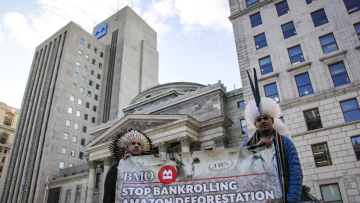JBS goes public in the US, now faces new legal backlash
Joe Evans, Big Agriculture Global Comms Lead at Greenpeace UK // +44 7890 595387
Maddie Guerlain, Senior Associate - Food, Nature & Climate, Global Strategic Communications Council (GSCC) //+44 7904 606916

Joe Evans, Big Agriculture Global Comms Lead at Greenpeace UK // +44 7890 595387
Maddie Guerlain, Senior Associate - Food, Nature & Climate, Global Strategic Communications Council (GSCC) //+44 7904 606916
JBS, the world’s largest meat company, officially joined the New York Stock Exchange (NYSE) today, despite a track record linked to corruption, deforestation, and escalating legal exposure. Leading shareholder advisors ISS and Glass Lewis had advised voting against the listing, citing a governance structure that disempowers minority shareholders and raises long-term ESG risks.
The company has amassed nearly $7 billion in legal liabilities, nearly as high as JBS’s entire 2024 adjusted earnings ($7.2 billion EBITDA) according to new research by Global Witness out today. Most of that increase came during its SEC application, as the company revised its “possible” legal losses upward by $3 billion in just five months, meaning JBS’s total reported liabilities have almost tripled in less than two years. JBS has only set aside provisions for $500 million, leaving $6.4 billion in potential losses uncovered, raising serious red flags for investors.
JBS’ annual estimated emissions exceed those of Spain, with its methane emissions alone rivalling ExxonMobil and Shell combined. Last week, the 2025 Corporate Climate Responsibility Monitor, ranked JBS among the worst-performing companies globally, citing a complete lack of credible emission reduction plans.
Its U.S. subsidiary, Pilgrim’s Pride, was the largest corporate donor ($5 million USD) to Trump’s inauguration, intensifying concern about the company’s political influence. Pilgrim’s has lobbied to weaken U.S. meat processing line speed regulations, a move that could undermine food safety and increase injury risk for workers in already awful conditions.
So what’s next for the meat giant?
New legal risks to the NYSE
- In a formal legal Notice to the NYSE, Mighty Earth this week warned that allowing JBS to list on its Exchange may violate U.S. anti-money laundering laws by enabling the distribution of profits tied to illegal deforestation in JBS’ beef supply chains in Brazil.
- The Notice cites the Lacey Act, which criminalizes U.S. trade in goods tied to violations of foreign environmental law, in this case the Brazilian Forest Code.
- Data analysis reveals that from May 2024 to April 2025, JBS shipped $767 million worth of beef from Brazil to the U.S., potentially linking its sourcing of cattle grazed on illegally deforested land to U.S. markets.
- In its April 11, 2025 SEC filing, JBS admitted it cannot guarantee the legality of its cattle supply chain:
“There can be no assurance that available monitoring procedures can ensure that the origin of any head of cattle was in full compliance with applicable laws, regulations or our Responsible Procurement Policy.”
Climate litigation risk in the Netherlands
- Now headquartered in the Netherlands as part of the company’s restructure during the listing process, JBS is exposed to Dutch corporate climate law. Legal experts say its emissions-heavy expansion plans, including new projects in Nigeria and Vietnam, could soon come under legal challenge.
- Dutch courts have already shown a willingness to act: in Shell v. Milieudefensie, they ordered Shell to align its global business model with climate science, a precedent that could soon apply to JBS.
“The shame is on the New York Stock Exchange as they have decided to list a climate culprit and abuser of millions of animals. We will not be silenced in exposing JBS, the biggest meat supplier in the world, as one of the most destructive, cruel, and unethical multinational corporations.
“Its emissions rival those of entire nations, which have consistently increased in recent years despite statements of net-zero goals. As we exposed in our recent report, JBS consistently shifts its profits to tax havens and away from the countries in which it operates. It is morally failing and putting profit ahead of people, animals, and the planet.
- Tricia Croasdell, CEO World Animal Protection
"JBS's first day of trading marks a dark milestone for forests and communities all over the world. Allowing a company with JBS’s deforestation footprint to access U.S. capital markets undermines global efforts to protect forests and meet climate goals. The SEC’s decision here isn’t just a risky choice for the market and investors, it's one with material planetary consequences.”
- Ashley Thomson, Senior US adviser, Global Witness
“JBS’ Wall Street listing hands the billionaire Batista brothers a fat payday while helping finance the global expansion of their beef empire, with grievous implications for nature and the climate. But JBS’ choice of the Netherlands as its new home may well see it join other big polluters whose growth plans are being challenged in the Dutch courts. Investors should be aware of the risk not only of being exposed to potentially costly and lengthy litigation but more critically a risk to the very viability of JBS’ growth-based business model, which forms the basis of their investment decision.
Greenpeace International fully intends to make sure that JBS plays by the Dutch rules and will take whatever steps it feels are necessary to ensure that JBS’ destructive growth plans are challenged.”
-Daniela Montalto, Senior campaigner at Greenpeace UK

